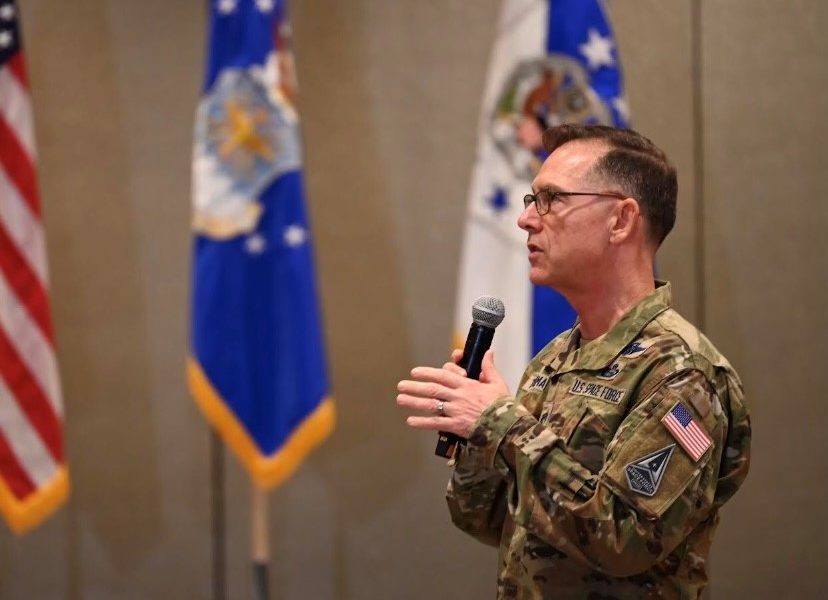When enlisted leaders from 65 nations gathered in a hotel ballroom to hear how the Space Force built an enlisted corps, seemingly few could apply the lessons. Most of their militaries didn’t have the equivalent of a Space Force. But the session attracted more questions than any before it during a weeklong summit to strengthen partner enlisted corps and to foster relationships that could lead to space.
“We’re new and independent, and we’re on that journey as some of you are on that journey,” Chief Master Sergeant of the Space Force Roger A. Towberman told the group as he paced the length of the room, taking numerous questions from countries in Latin America and Africa, some of which host Chinese space assets.
Towberman took the opportunity during the Senior Enlisted Leaders International Summit in Arlington, Va., on Aug. 2 to encourage the nations to get onboard with the Space Force’s value of good behavior in the space domain. He invited the leaders to call him personally to discuss ways to cooperate with the United States in space.
“We’ve developed our own promotion system. We’ve developed our own assignment system—all of the things that any service has to do. But we’re right in the middle of it,” Towberman said, describing how in three years, three field commands have stood up with 7,500 Guardians in uniform, a quarter of whom never wore an Air Force uniform.
“That makes the Space Force a great teammate and a great source of information, and we’re happy to partner with anyone,” Towberman said. “We’re trying to figure out, how do we develop our noncommissioned officer corps? How do we develop great technicians? How do we develop a culture that is independent and distinct from any of the services that built us?”
Towberman responded to questions about threats in space, including the debris fields created by China’s and Russia’s anti-satellite weapon tests, and Russia’s projectile-firing space satellite. The Space Force’s senior enlisted leader called for establishing norms even before every spacefaring nation is in agreement.
“It needs to start somewhere,” he said. “It’s important that we don’t perhaps wait for a perfect solution where everyone can agree, but somebody has to start drawing boundaries.”
One African questioner drew laughs when an Airman had to translate his lengthy, three-part question about how to protect military communications systems and satellites and how to clean up the debris field.
“Partnerships, partnerships, partnerships,” Towberman said. “We have got to work together to protect the systems and to ensure, from a military perspective, that our allies have access to the systems and capabilities that they want.”
The Space Force official called for more communication, more information sharing, and more access agreements, noting that the proliferation of satellite companies means any nation can launch a satellite into orbit.
“It won’t be limited by physics or by technology,” he said. “It will be limited by relationships, by partnerships, by policy, perhaps by law.”
The ‘Classic Model’ vs. ‘Gigonomics’
Towberman also discussed talent management at the Space Force and what he learned from a 2021 visit with human capital leaders at SpaceX.
“We’ve made one of our core values as a service a commitment to growth,” Towberman said, echoing what he learned from the commercial space company.
“We recruit from the beginning people that want to improve themselves and grow and develop continuously,” he added, noting that unlike generations past, the younger generation does not want to stay in the same career for decades. Space Force, in turn, is creating flexible development programs.
“The classic model is, I commit, and on the first day of my career, someone says, ‘You’re going to do this,’ and I do that for 20 years or 30 years,” he said. “We don’t believe that that resonates very well with American young people today that they want to be able to do different things.”
The Space Force is trying to build a development structure that allows Guardians to grow and develop in different ways that still fill the service’s needs.
“It’s hard. It can be frustrating, as well,” Towberman said.
Experts he has spoken to indicated that building a culture can take 10 years.
“We’re just slowly kind of marching and doing the best that we can,” he said. “Sometimes we don’t even know that we’re being, you know, unwilling to change. It feels like [being] quite open minded.”
In a pull-aside interview with Air Force Magazine, Towberman said he has embraced the mindset of the younger generation. One way the Space Force demonstrated a long-term commitment was to allow Guardians to help develop the service’s four core values.
“I love this sort of gigonomics,” he said, referring to careers that are broken up into short-term stints. “I love their energy. I love the sort of servant attitude that we see from young people today. And I’m happy to lean into it.”
“Our values [are] probably the most significant kind of place where we went to young Guardians and we talked to them about what was important to them,” Towberman added. “That’s probably the biggest success is just baking them into those processes and listening more and kind of talking less.”
